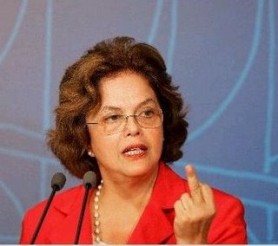SAO PAULO, (Reuters) – Former guerrilla leader Dilma Rousseff won Brazil’s presidential election today after promising to stick to policies that have lifted millions from poverty and made Brazil one of the world’s hottest economies.
Brazil’s election authorities officially called the vote in Rousseff’s favor after she amassed 55.7 percent of valid votes compared to 44.3 percent for opposition candidate Jose Serra, with 95 percent of votes tallied.
The result completed an unlikely journey for Rousseff that took her from jail and brutal torture by her military captors in the 1970s to become the first woman to lead Latin America’s largest economy.
An economist and former energy minister who leans left but has become more pragmatic over time, Rousseff had never run for elected office. Yet she received decisive support from Brazil’s wildly popular President Luiz Inacio Lula da Silva, who plucked her from relative obscurity to succeed him.
“I think she will continue Lula’s work,” said Elizabete Gomes da Silva, a factory worker in Sao Paulo. “He governed for the people who needed him most — the poorest.”
During Lula’s eight years in office, his stable fiscal policies and social programs helped lift 20 million Brazilians, or more than 10 percent of the population, out of poverty.
The burgeoning middle class is snapping up cars and building houses at a pace never seen in Brazil before, helping make it a rare bright spot in the global economy along with other developing giants such as China and India.
That legacy was simply too much for Serra to overcome.






